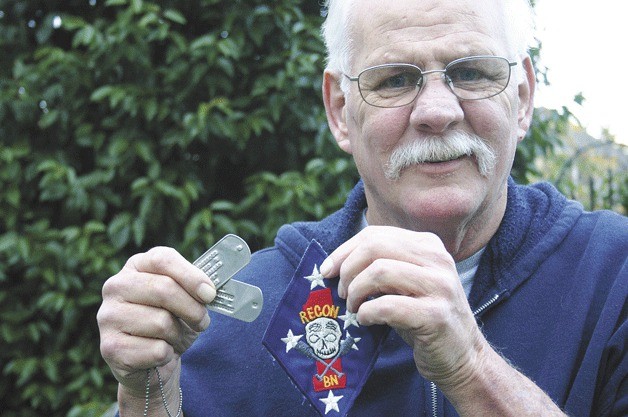Gary Nau pretty much knows what he’ll be doing on Veterans Day on Thursday.
He’ll watch a couple of marathon Civil War and World War II dramas on television, then retreat to a quiet place to think about his war.
“When I go off to myself, I think about friends who have fallen,” he said Monday. “I can’t stop the wars, but I can certainly pray that they end.”
Nau, 65 this month, is still dealing with the effects that war inflicted on him 45 years ago in the jungles of Vietnam.
“I love this country, and I would die for this country, but give me a valid reason,” Nau said. “Vietnam didn’t make any sense to me at all.”
The lengthy United States involvement in the 20-year war against Communist expansion in Southeast Asia cost millions of lives, include more than 58,000 U.S. casualties, some of whom Nau knew well.
At a crossroads in his young life, he joined the Marine Corps at 19 and a year out of high school in Southern California, and soon found himself a member of a reconnaissance patrol in the southern jungles of Vietnam.
Nau said he spent 13 months in Vietnam, from May 1965 to June 1966, jumping in and out of helicopters with eight of 10 other Marines, gathering information about the enemy and relaying it back to the infantry.
It was during a period of steep escalation of U.S. involvement in the war.
“There was some pretty crazy stuff going on,” he said. “I saw action all the time.”
“And yes, I shot people,” he continued. “It’s the worst experience in the world. I never got used to it.”
And he added: “What was really scary about having to shoot at somebody in the jungle is that it got to be really quick and easy.”
Despite being in the thick of things for most of his tour of duty in Vietnam, Nau was never wounded, although he said there were several close calls.
Some of his fellow Marines weren’t so lucky, he said: About a dozen members of his 65-man company died during his time in Vietnam.
Although the bullets missed him, he wasn’t so fortunate in other ways. Forty five years later, he still suffers Post Traumatic Stress Syndrome (PSTD), tuberculosis, diabetes “and a few other things.”
He blames his tuberculosis and his diabetes on contact with Agent Orange, the controversial chemical defoliant used by U.S. forces to burn away huge swaths of jungle to get at the enemy.
“I walked through it twice,” Nau said. “We weren’t alerted it was there.”
Nau got out of the Marines two years later, amid the rising tide of anger back home against the war.
“It’s night and day, the difference between then and now,” he said. “We were spat on, and called baby killers and warmongers. Today’s vets are heroes — and they should be. They deserve it.”
Nau said he didn’t need any encouragement when it came to the Vietnam war.
“I protested as soon as I got out of the service, because too many people were killed needlessly,” he said.
Nau also fell into self abuse.
“There were years and years where I stuffed away my feelings about the war,” he said. “I went through a lot of alcohol and drug abuse, and a failed marriage. But I’ve been sober for 32 years.”
Nau said the Veterans Administration helped him to pull out of his tailspin, and he still visits the VA Hospital in Seattle once a month or so to see psychiatrists, who help him with his PTSD and his recurring nightmares.
“They’ve helped me control my anger and rage,” he said.
When he got his life back on track, he said he worked a number of jobs, mostly in the aerospace industry in California. He moved to Whidbey Island about eight years ago, and he and his wife, Lauri, live with two dogs and a cat at Useless Bay.
He’s retired now, and focuses most of his time and energy helping the Veterans Resource Center, headquartered in Langley, expand its programs.
The VRC estimates that 2,000 veterans of Iran and Afghanistan have returned to the island in the past eight years.
According to the 2000 Census, there were 12,000 veterans on Whidbey, and another 8,000 active duty personnel at Naval Air Station Whidbey Island in Oak Harbor.
Last month, the VRC opened a new Community Activities Center in a Freeland office park, a place where veterans, family members and others can take part in a number of programs designed to ease the way back into a normal life.
“It’s something that’s real,” Nau said of the center. “It’s a place where people can come and relax and talk and get to know each other. I have great hopes for it.”
Nau, however, remains adamantly opposed to most wars, including those in Iraq and Afghanistan.
“I can’t stand these wars we’re in,” he said. “They don’t make sense to me.”
“War can make you do crazy things,” he continued. “It’s a pretty big burden for these kids.
“I don’t have all the answers,” Nau added. “I’m totally patriotic. I cry when I hear ‘The Star-Spangled Banner.’ All I want to do is help the broken vet.”
A special program honoring Whidbey Island veterans and offering
ways to heal the wounds of war will be from 6:30 to
8:30 p.m. Thursday, Nov. 11, at the Veterans Resource Center’s new Community Activities Center, 1796 Main St. in Freeland. The public is invited.
For information call 321-7226 or e-mail info@vrcwi.com.
The VRC’s Community Activities Center, a drug- and alcohol-free facility, is open for drop-in visitors on Tuesdays and Thursdays from 2 to 7 p.m., and on Saturdays from 10 a.m. to 2 p.m.
For information about the VRC, or to volunteer or donate, visit the website www.vetsresourcecenter.org.



